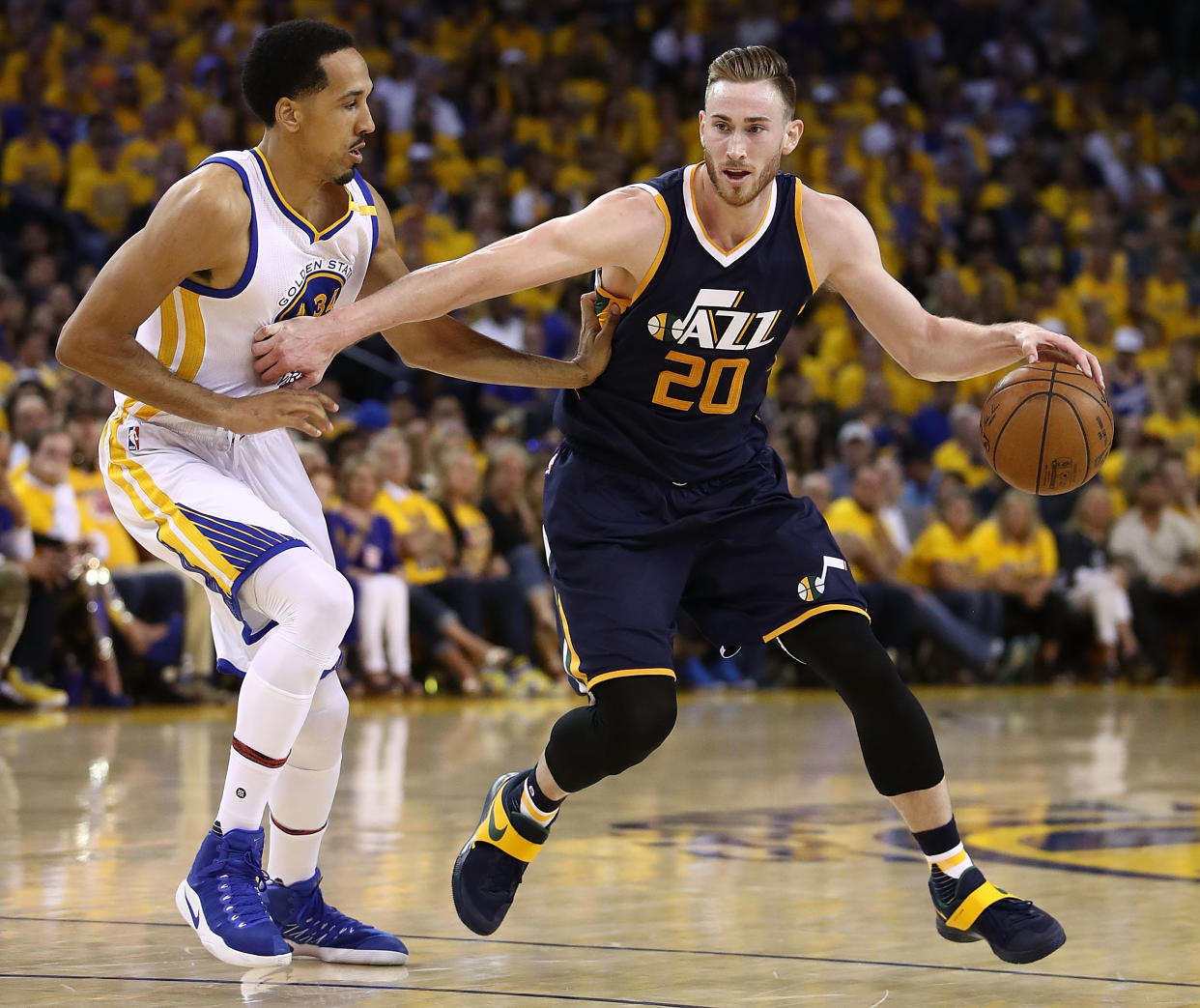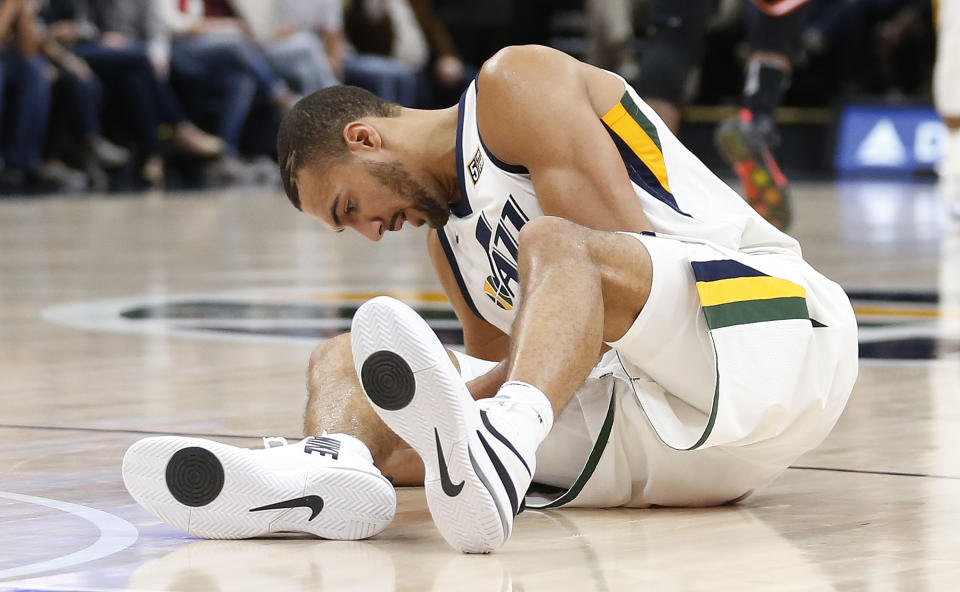Inside the Jazz’s mission to flourish in the post-Gordon Hayward era

An up-close look at the major movers, players and storylines of the NBA.
More Open Court: Timberwolves’ defense still lacking teeth
SALT LAKE CITY – From a back office in Vivint Smart Home Arena, Jazz GM Dennis Lindsey could only watch as another game slipped away. Monday’s 109-98 loss to Minnesota dropped Utah to 6-8 on the season, with just a win over Brooklyn breaking up a brutal 1-5 stretch. For a team that once appeared on the cusp of joining the Western Conference’s elite, success never seemed so far away.
There are days you look at the Jazz and wonder: How do they do it? How do they rebuild? Gordon Hayward’s free-agent exit scuttled four years of progress, thrusting a 51-win team into limbo. Suddenly, Utah was where few teams want to be: Too good to tear the team down, not good enough to be anything more than .500. An elite, battle-tested defense remained the team’s backbone, but the defection of a 21.9-point scorer ripped its offense apart.

On Sunday, coach Quin Snyder leaned back in a windowless room in the Jazz’s practice facility and acknowledged the obvious: The road back could be a long one. “There is always an optimism at the beginning of the season,” Snyder told Yahoo Sports. “And I’m not saying there isn’t that now, but it’s tempered a little bit with the personnel changes.” Indeed, since losing Hayward, Utah has been ravaged by injuries, from the potentially season-ending shoulder injury to Dante Exum, to a balky right wrist that has cost Joe Johnson all of November, to a knee injury that will keep Rudy Gobert on the sideline for at least the next month. Gobert’s injury looms largest: The 7-foot-1 pivot was the anchor of one of the NBA’s top defenses, and the Jazz have been gashed badly in the two games he has missed.
Utah would love to offer up a blueprint for how to rebound from Hayward’s departure. Fact is, there isn’t one. The team bet everything that it could lure Hayward back, and his decision to leave has left a hole it can’t hope to fill. “There isn’t a silver bullet,” Snyder said. “What there is, though, is a challenge. That’s something you can really embrace and enjoy.”
To rebuild, the Jazz have fallen back on what they thrive at — player development. Utah didn’t rise to a conference semifinalist last season with Sixers-like blue-chip talent, instead depending on a collection of late lottery picks (Hayward, Alec Burks) and later first-rounders (Gobert, Rodney Hood) shrewdly identified by Lindsey and flawlessly developed by Snyder and his staff.
The team isn’t in the same situation as it was in 2013-14, when a group of fresh-faced, early 20-somethings battled through a 25-win season. For some though, the situation feels familiar. Utah is still well stocked with young talent. Hood is a budding scorer being guided into an enhanced role, while the team believes it has something in Donovan Mitchell, a 6-3, 211-pound bulldog of a guard who has already found a home in Snyder’s rotation.
It’s a challenge — one the Jazz brass is up for. In the aftermath of Hayward’s exit, there was little appetite for a total teardown. Ownership didn’t want it, nor did Snyder, and Gobert prodded the front office last summer to go all in on a defensive identity, encouraging the midsummer acquisitions of Thabo Sefolosha and Ekpe Udoh. Lindsey cautiously tweaked the roster, careful not to jeopardize future cap flexibility.

With Gobert, Utah knows what it can be defensively. Offensively? “The evolution of what we are going to do offensively is going to take time,” Snyder said. The Jazz still grind out possessions, and teams are wary of the discipline Utah shows in its halfcourt sets. “They wear you down mentally with that offensive system,” Heat coach Erik Spoelstra told Yahoo Sports. “You have to defend 18, 20 seconds every possession against them.” Added forward Joe Ingles, “We have smart guys that know how to make plays. Eight seconds, six seconds on the shot clock is still a long time. You can get three, four passes off. The more we move the ball, the more connected we are as a team.”
Yet without Hayward, the Jazz’s margin for error offensively is slim. On Friday, Utah took a 49-37 lead against Miami into halftime. It wasn’t until five minutes into the third quarter that the Jazz scored again in an 84-74 loss. For years, Hayward was the bailout shooter, and a large chunk of the gobs of midrange jump shots the Jazz jacked up last season went to him.
“We were a team that took a lot of midrange shots,” Snyder said, “because that’s what was there and he was a guy that can make those.”
Swapping George Hill for Ricky Rubio has given Utah something it has not had in years: An up-tempo, pass-first playmaker who excels in the open floor. And it’s been an adjustment. Rubio admits there have been times he has raced out in transition only to find himself alone ahead of the field, while his teammates are adapting to a player who pushes the ball reflexively.
“I’m used to running halfway down the floor, looking around, because we are used to running a set,” Ingles said. “Now, coaches are on the wings to sprint to the corner, turn around and get it set up from there. It takes some getting used to.”
There is no lamenting the loss of Hayward in Utah, no waxing about what could have been. Snyder’s disappointment dissipated in July, at the NBA’s summer league, when he ran into Spoelstra wandering through a hotel. Spoelstra recounted his own experiences with high-profile losses, from LeBron James to Dwyane Wade to Chris Bosh. “He was really encouraging,” Snyder recalled. “That meant a lot.”
Utah entered the season hell-bent on competing, on grinding out enough wins to sneak into the playoffs. The rash of injuries will make that difficult. Still, the Jazz are determined to maintain a constructive culture. Lindsey’s father-in-law, former college and NFL coach F.A. Dry, has a saying: Players don’t develop among weeds and rocks. The message: Environment matters. Utah will work with Hood to make him as effective creating his own shot as he is when others create for him. The Jazz will try to slow the game down for Mitchell. With Rubio, the Jazz envision a Steve Nash-like midrange pull-up eventually becoming a part of his game.
There’s another reality: The roster overhaul may not be over. Utah will have a tough decision to make on Derrick Favors this summer, and a likely lottery pick they will have to hit on before then. Hayward ended an era in Utah. A new one is set to begin.
More from Yahoo Sports:
• With Trump’s help, LiAngelo Ball, UCLAteammates are headed home
• Enes Kanter, Knicks weren’t going to let LeBron James rook Frank Ntilikina
• MLB star retires after winning elusive World Series
• GQ magazine names Kaepernick ‘Citizen of the Year’


